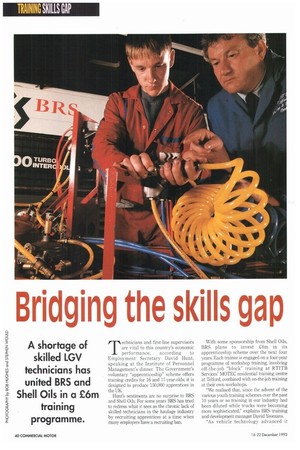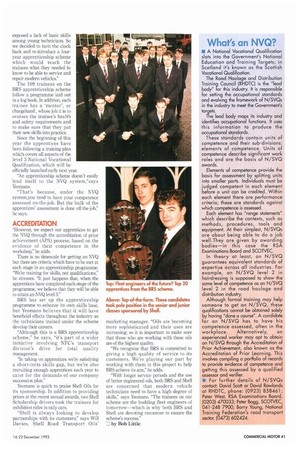Bridging the skills gap
Page 42

Page 43

If you've noticed an error in this article please click here to report it so we can fix it.
Technicians and first-line supervisors are vital to this country's economic
performance, according to Employment Secretary David Hunt, speaking at the Institute of Personnel Management's dinner. The Government's voluntary "apprenticeship" scheme offers training credits for 16 and 17-year-olds; it is designed to produce 150,000 apprentices in the UK.
Hunt's sentiments are no surprise to BRS and Shell Oils. For some years BRS has tried to redress what it sees as the chronic lack of skilled technicians in the haulage industry by recruiting apprentices at a time when many employers have a recruiting ban. With some sponsorship from Shell Oils, BRS plans to invest am in its apprenticeship scheme over the next four years. Each trainee is engaged on a four-year programme of workshop training, involving off-the-job "block" training at RT1TB Services' MOTEC residential training centre at Telford, combined with on-the-job training at their own workshops.
"We realised that, since the advent of the various youth training schemes over the past 10 years or so training in our industry had been diluted while trucks were becoming more sophisticated," explains BRS training and development manager David Yeomans.
"As vehicle technology advanced it exposed a lack of basic skills among young technicians. So we decided to turn the clock back and re-introduce a fouryear apprenticeship scheme which would teach the trainees what they needed to know to be able .to service and repair modern vehicles."
The 109 trainees on the BRS apprenticeship scheme follow a programme laid out in a log book. In addition, each trainee has a 'mentor', or chargehand , whose job it is to oversee the trainee's health and safety requirements and to make sure that they put their new skills into practice.
Since the beginning of this year the apprentices have been following a training plan which covers all aspects of the level 3 National Vocational Qualification, which will be officially launched early next year.
"An apprenticeship scheme doesn't easily lend itself to the NVQ system,"says Yeomans.
"That's because, under the 1\117Q system,you tend to have your competence assessed on-the-job. But the bulk of the apprentices' assessment is done off-the-job," he says.
ACCREDITATION
"However, we expect our apprentices to get the NITC) through the accreditation of prior achievement (APA) process, based on the evidence of their competence in the workshop," he adds.
There is no timescale for getting an NVQ but there are criteria which have to be met at each stage in an apprenticeship programme: "We're training for skills, not qualifications," he stresses. "It just happens that, when the apprentices have completed each stage of the programme, we believe that they will be able to attain an NVQ level 3."
BRS has set up the apprenticeship programme to enhance its own skills base, but Yeomans believes that it will have beneficial effects throughout the industry as the technicians trained under the scheme develop their careers.
"Although this is a BRS apprenticeship scheme," he says, "it's part of a wider initiative involving NFC's transport division's drive for total quality management.
"In taking on apprentices we're satisfying a short-term skills gap, but we're also recruiting enough apprentices each year to cater for the demands of our company succession plan."
Yeomans is quick to praise Shell Oils for its sponsorship. In addition to providing prizes at the recent annual awards, two Shell Scholarship drivers took the trainees for exhibition rides in rally cars.
"Shell is always looking to develop partnerships with its customers," says Will Davies, Shell Road Transport Oils' marketing manager. "Oils are becoming more sophisticated and their uses are increasing; so it is important to make sure that those who are working with these oils are of the highest quality.
"We recognise that BRS is committed to giving a high quality of service to its customers. We're playing our part by working with them in this project to help BRS achieve its aim," he adds.
"With longer service periods and the use of better engineered oils, both BRS and Shell are concerned that modern vehicle technicians need to have a high degree of skills," says Yeomans. "The trainees on our scheme are the budding fleet engineers of tomorrow—which is why both BRS and Shell are devoting resources to ensure the scheme's success,"
7 by Bob Little




















































































